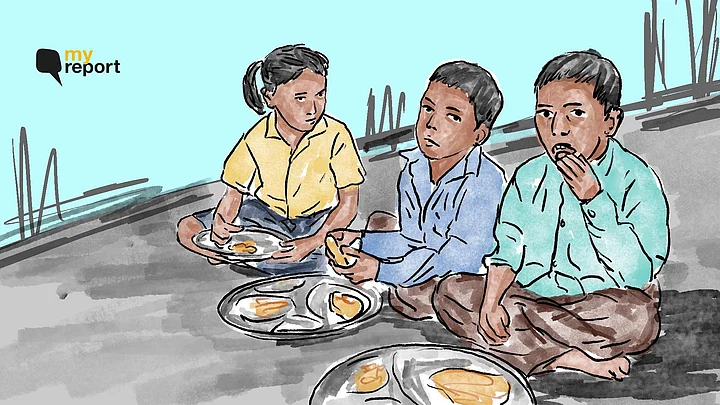Palms on their faces – that was how I was welcomed by Seema, Rubi, and Kajal at the Ghazipur border.
When asked why they were hiding their faces, they simply blushed. These three friends were living at the farmers' protest site for an entire year. Before that, they used to beg, pick rags, and work at small tea stalls.
Not just these three, but many children around the Ghazipur border were dependent for food on the community langars provided by the farmers.
For over a year, the farmers were protesting against the three farm laws, which the Union government had repealed on 20 December.
While many seem happy that a tough phase for the farmers have finally come to an end, not everyone appears to share the sentiment.
Sonu, 7, was standing in a corner with a cup of tea and bread. One could easily sense the tension on his face about the uncertainty of his future as these farmers were leaving the protest site.
He and his two siblings would always come to the langars for their daily meals.
The same goes for six-year-old Geeta, who had earlier picked rags in Laxmi Nagar. When her mother heard about the community langars – a stable source of food – she brought Geeta to the Ghazipur border, and started helping the farmers in the kitchen, serve tea, etc.
Back To Square One
Kajal was a little comfortable with me when I spoke to her on one of my previous visits to the protest site.
When asked what they would do now that the protests were over, they said that they would go back to their slum at Vinod Nagar.
They confessed that they have actually forgotten how to pick rags properly now – what to pick, what to leave, etc. They were very happy doing odd jobs for farmers, like cooking, serving tea, and cleaning.
Speaking about the protestors, Seema told me about a woman, whom she referred to as Pinku aunty. "She was very caring, she used to speak politely, asked if we wanted food, again and again. She used to take care of us like a mother," Seema recalled.
"Pinku aunty left the protest site even before the official withdrawal," she added.
Kajal has to go back to ragpicking now, and take the collection to her brother, who filters the required waste and sells it to the local collector. She will again spend her days on roads, roaming around in search of waste, then help her mother cook at night. Earlier, all three of them would come to the protest site to eat.
Rubi was the most reserved of them all. Seema told me that she has to go back home, where she doesn’t feel good. She was also holding the ragpicking bag, but didn’t answer if she would work as a ragpicker now.
These stories from kids shows the bleak reality of our country. One should rethink before calling this country – where kids must depend on protests to feed themselves – a superpower or "vishwaguru".
(All 'My Report' branded stories are submitted by citizen journalists to The Quint. Though The Quint inquires into the claims/allegations from all parties before publishing, the report and the views expressed above are the citizen journalist's own. The Quint neither endorses, nor is responsible for the same.)
